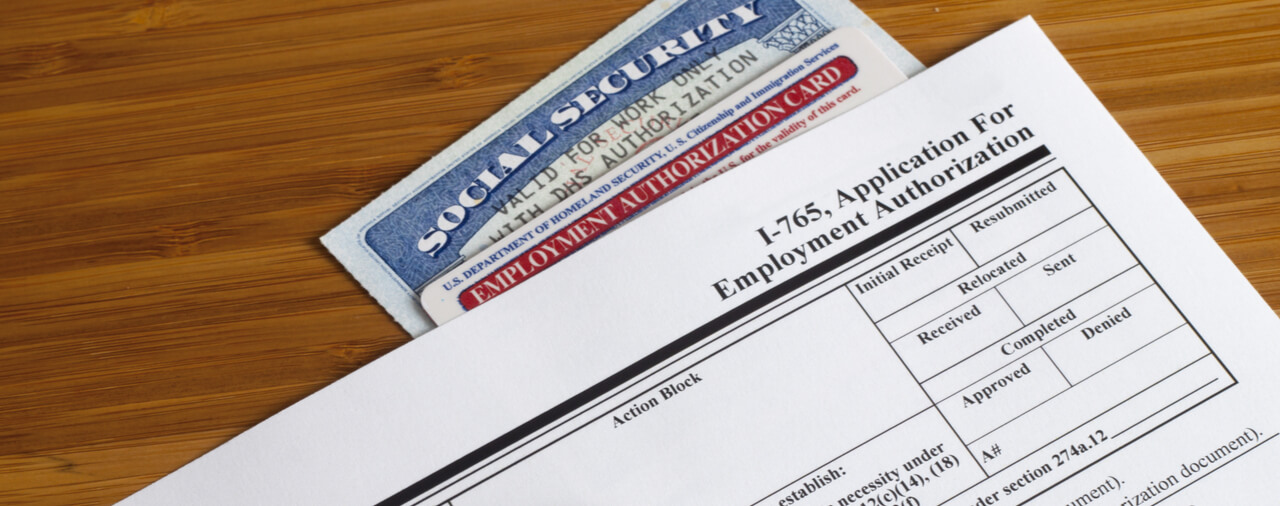- Introduction
- Guidance in the USCIS Tip Sheet
- In the Context of the New Rules Regarding Form I-765 Processing and Automatic Extensions
- Conclusion
Introduction
The United States Citizenship and Immigration Services (USCIS) has a policy for applicants for Employment Authorization Documents (EADs) to make a service request for a long-pending Form I-765, Application for Employment Authorization. In this article, we will explain the rules for when an EAD applicant may make a service request on a pending EAD application with the Form I-765, including in the context of the new automatic 180-day extension of EADs for certain renewal applicants. We will rely on the USCIS guidance on the issue titled “Tip Sheet: Employment Authorization Applications Pending More than 75 Days” (last updated Feb. 1, 2017) [link].
Please also see our full article on the automatic extension of EADs in certain categories and the USCIS’s decision to do away with the regulatory requirement that it process all applications for new EADs within 90 days [see article].
Guidance in the USCIS Tip Sheet
The Tip Sheet explains that an applicant with a Form I-765 that has been pending for more than 75 days may contact the USCIS’s National Customer Service Center (NCSC) and ask to create a service request for the pending EAD. A service requests asks the USCIS for priority processing of the pending Form I-765. The phone number for the NCSC as of April 12, 2017, is 1-800-375-5283. Upon receiving such a request, the NCSC will route the service request to the USCIS office adjudicating the EAD for review. The USCIS advises that applicants should have their receipt number ready when contacting the NCSC to make a service request.
The USCIS instructs individuals to consider the following when making a service request on a pending Form I-765 application:
1. In the event that the USCIS issues a request for initial evidence for the Form I-765, the date for calculating the processing time on the Form I-765 will start over from the date the USCIS receives the initial evidence. “Initial evidence” is defined as any piece of evidence specified by the regulation or specifically requested on the instructions for the Form I-765.
2. If the USCIS issues a request for additional evidence, the processing time clock will pause on the date the request is issued and resume from that same point when the USCIS receives the evidence. This means that the applicant will not “lose” time that had already been accrued before the USCIS made the request for additional evidence. Additional evidence is defined as evidence that is beyond that which is required by the regulations, the Form I-765, or the instructions for the Form I-765, but which is determined to be pertinent by the USCIS in adjudicating the petition.
3. In certain categories, the USCIS cannot process a Form I-765 until it approves another application or petition. This is because in these categories the approval of the Form I-765 depends on the approval of the other application or petition. For example, if the Form I-765 is filed in conjunction with a Form I-539, Application to Extend/Change Nonimmigrant Status, and the Form I-765 EAD application is based on the extension of status application, the USCIS will only begin processing the Form I-765 after the approval of the underlying Form I-539.
4. If an applicant requests to reschedule the fingerprint appointment, the date for calculating the processing time of the Form I-765 will start over from the date of the request for rescheduling.
In the Context of the New Rules Regarding Form I-765 Processing and Automatic Extensions
On January 17, 2017, a new final rule went in affect amending the regulatory requirement that bad been found in 8 C.F.R. 274a.13(d) that required the USCIS to fully adjudicative Forms I-765 applications within 90 days. Additionally, the USCIS provided for an automatic 180-day extension of EADs for renewal applicants in certain categories. Please see our full article to learn about these issues in more detail [see article].
At 82 FR 82 82398, 82458 (Nov. 18, 2016) [PDF version], the Department of Homeland Security (DHS) made clear that applicants who are not covered by the 180-day extension will remain eligible to call the NCSC and make a service request for Form I-765 applications that have been pending for 75 days or more in order to request priority processing.
In the same provision, the DHS explains that if an applicant is covered by the new automatic 180-day extension, he or she will be able to make a service request if the application is still pending at day 165 of the automatic extension. The 180-day automatic extension begins for eligible EAD renewal applicants upon the expiration of their old EAD.
Conclusion
Despite the recent rule changes regarding EAD processing, the USCIS will continue to accept service requests for long-pending EADs under certain circumstances. An applicant seeking an EAD or any other immigration benefits is well advised to consult with an experienced immigration attorney for case-specific guidance.





